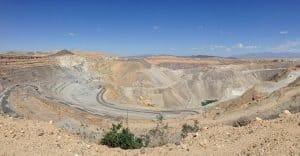Today, a federal appeals court ruled that the U.S. Forest Service is liable for toxic waste clean-up costs from mining on national forest land. The appeals court remanded the case back to the district court to determine how much the Forest Service would have to pay of the $1 billion in clean-up costs associated with a single molybdenum mine in New Mexico. The case is the first to conclude that the 1872 Mining Act, which gives mineral claimants the right to mine federal land, does not relieve the Forest Service from its CERCLA (“Comprehensive Environmental Response, Compensation, and Liability Act”) responsibility as landowner for the cost of cleaning up toxic wastes.
The unanimous opinion by Reagan, G.W. Bush and Clinton appointees, scolds the Forest Service for dereliction of its duty to regulate mining to avoid spendy clean-up costs:
There is no dispute that the United States held fee title to relevant portions of the Questa mining lands during the time of hazardous substance disposal, part of the area that today comprises the Questa Site. We do not doubt that it could have exercised greater powers, regulatory or otherwise, over the lands if it wanted to do so.
This decision could be a game changer. No longer can the Forest Service and BLM hide behind the 1872 Mining Act and ignore the environmental costs of the mining operations they approve on public lands. Just the existing liability for past mining waste could put a big dent in the Forest Service’s budget, which has a sum total of $0 appropriated for CERCLA clean-up costs.
From here on out, when the Forest Service approves surface occupancy plans for 1872 mining act claims, it had better look carefully at its clean-up liability. Under some scenarios, the Forest Service, as landowner, could be stuck with 100% of the clean-up costs.

WOW, that seems like a real game changer.
So true! However, I suspect that this ruling will be appealed.
The Forest Service itself cannot appeal from the decision; only the Solicitor General can decide to petition for U.S. Supreme Court review. More often than not, he does not. And, even if he does, the Supreme Court does not have to accept the case.
Why would the FS not be liable for costs associated with clean up? It’s purpose is to manage the use of the land and it obviously failed to do that.
Thanks, Andy. The $0 budget pretty clearly shows that the Forest Service thought it was playing a different game. It was nice of Chevron to point out that there is a cost to the government of lax regulation of mines on federal lands.
This only applies to unpatented claims under the 1872 Mining Act, where the federal government still owns the land. I don’t know how common that is (relative to patented claims), but this makes it less desirable to patent a claim and remove the federal ownership interest.
It will be interesting to see what “equitable portion” of the costs get assigned to the Forest Service (based on its role).